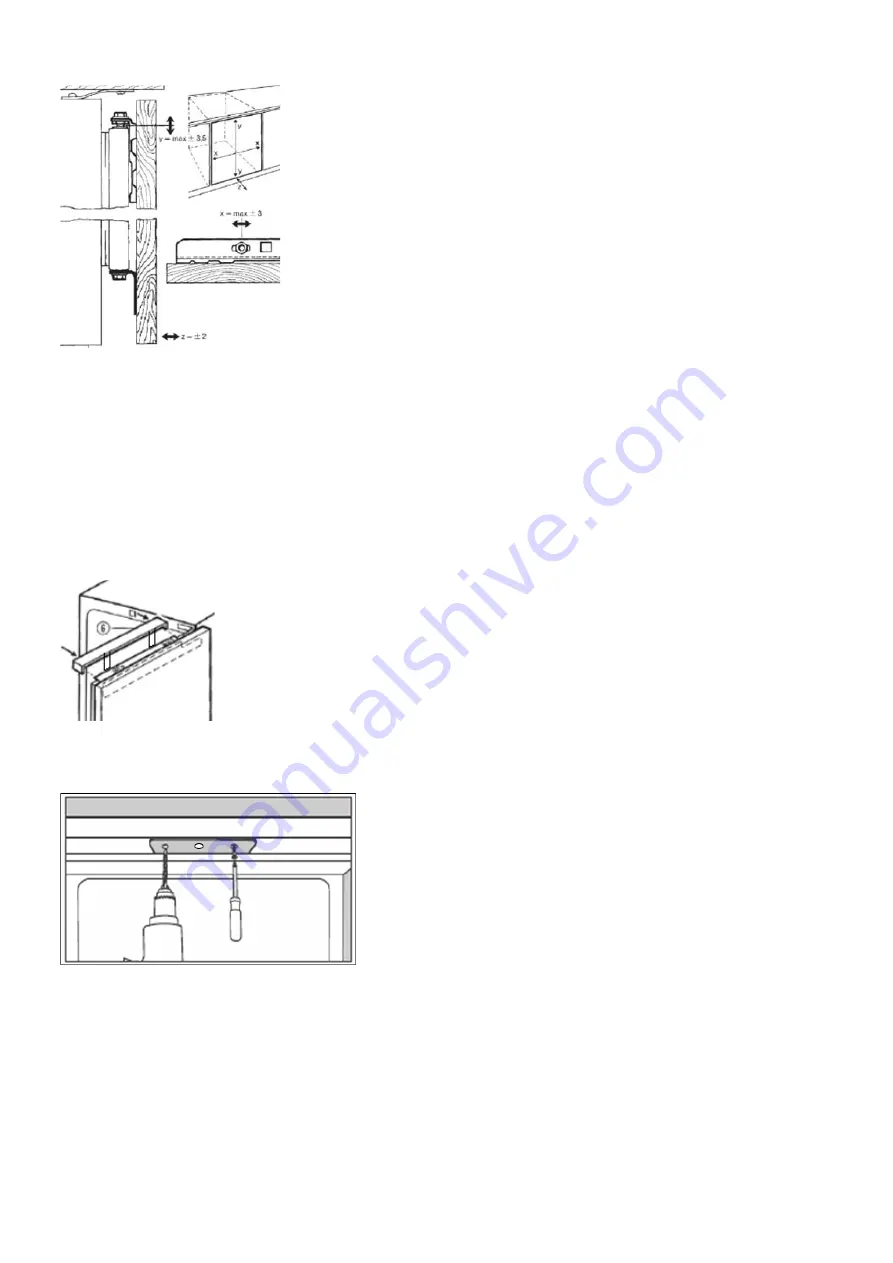
21
4.
Use a screwdriver to adjust the gap on the lower section of the
adjusting bolts. The gap should be set to approximately 9 mm (as
shown in the above drawing).
5.
Fix the lower bracket to the bottom of the furniture door and the
underneath of the appliance door (as shown in the drawing on the
previous page).
o It is possible to make minor adjustments to the position of the
furniture door using the screws on the top and the bottom of the
appliance door. You should make these adjustments so that the
furniture door is level.
6.
Insert the cover plate to the top of the appliance, this will just clip
into place.
7.
Open the appliance door.
o Use a suitably sized drill bit to drill through the holes in the bracket,
into the work top.
IMPORTANT: The drill bit should be appropriate for the material that
your work top is made from.
o Secure the bracket to the underside of the worktop, using the screws
provided.
IMPORTANT: These screws should be fully tightened.
o If the appliance is being installed under a granite worktop, use the L
shaped brackets provided to secure the fridge to the side of the
cabinet. Use a suitably sized drill bit to drill through the three holes in
the bracket into the cabinet side on the opposite side to the hinges.
o The oval holes rest over the hinge positions which are not being used
on the front of the appliance. Use two screws to secure the bracket to
the front of the appliance.
o Check that the door opens and shuts without snagging, as well as
checking that the door is sealing correctly.
TROUBLESHOOTING
IMPORTANT: If your freezer appears not to be operating properly,
before contacting the Customer Care Department, please refer to the
checklist below.
My freezer does not appear to be working/there is no power to my
appliance.
o Check that the plug is fully inserted into the power socket.
o Check that there is power to your mains supply (e.g. that there
hasn’t been a power cut or that the fuse hasn’t blown).
o Check that the thermostat inside the appliance has not been turned
to the <0> position.
o Check that your mains supply voltage, corresponds to the voltage
stated on the rating plate of your appliance.
My freezer appears to be performing poorly
o Check that the appliance isn’t overloaded and that food hasn’t been
packed too tightly into it.
o The thermostat setting is too low; you should turn the thermostat up
higher.
o Ensure that the door is closing properly and that the door has not
been opened for a prolonged period in error.
o Ensure that there is adequate ventilation for your appliance.
My freezer is noisy
o The refrigerant gas that circulates the pipework of the appliance may
make a slight noise, even if the compressor is not running.
o If the noise worsens or the appliance gets louder than normal; check
that it is levelled off correctly, that nothing is touching the rear of the
fridge and that nothing placed inside the appliance is rattling.
Ice has quickly formed on the inner back wall of my freezer
o Check that food has not been pushed too far back inside the
appliance, so that it is in contact with the inner back wall.
DO NOT ATTEMPT TO REPAIR THE APPLIANCE YOURSELF.
Please note that if an engineer is asked to attend whilst the product is
under guarantee and finds that the problem is not the result of an
appliance fault, then you may be liable for the cost of the call out
charge.
The appliance must be accessible for the engineer to perform any
necessary repair. If your appliance is installed in such a way that an
engineer is concerned that damage will be caused to the appliance or
your kitchen, then they will not complete a repair.
















































